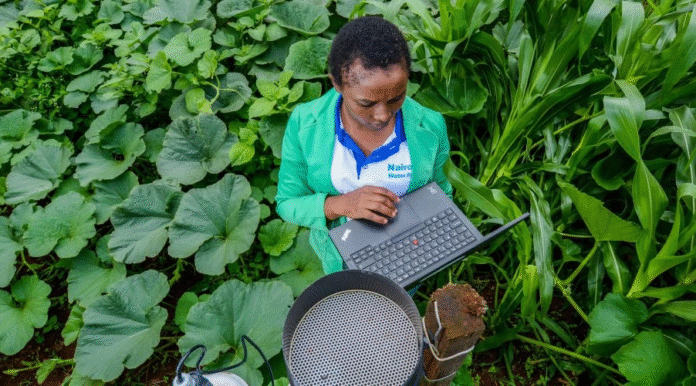Illustrative Image: Artificial Intelligence in Agriculture: Transforming Farming and Food Security in Sub-Saharan Africa
Image Source & Credit: CIAT/Georgina Smith
Ownership and Usage Policy
A quiet revolution in Africa’s farmlands
Across Sub-Saharan Africa, a digital transformation is unfolding—one that could redefine the very foundations of food production. Artificial Intelligence (AI), once confined to laboratories and tech startups, is now making its way into the fields and farms of smallholder producers. From Kenya’s semi-arid plains to Ghana’s fertile valleys, AI-powered tools are reshaping the way farmers plant, monitor, and harvest crops.
This shift is not merely technological—it represents a broader socioeconomic transformation. AI is emerging as a key driver in addressing three interlinked crises that have long challenged the region: food insecurity, environmental degradation, and economic inequality.
AI’s transformative potential in modern agriculture
Globally, the integration of AI in agriculture is growing at an unprecedented pace, projected to expand from $1.7 billion in 2023 to $4.7 billion by 2028, at a compound annual growth rate of 23%. In Sub-Saharan Africa, the agri-tech ecosystem has mirrored this surge: private investment rose from under $10 million in 2014 to nearly $600 million by 2022—a sign that investors recognize the sector’s transformative potential.
The driving forces behind AI adoption are multifaceted. As farmers grapple with labor shortages, rising input costs, and climate-induced unpredictability, AI offers precision, efficiency, and foresight.
Precision agriculture, powered by AI, integrates data from satellite imagery, drones, and geographic information systems (GIS) to provide real-time insights into crop health, soil fertility, and moisture levels. These insights enable farmers to use fertilizers, water, and pesticides precisely where needed—reducing waste and environmental impact while boosting yields.
AI also supports computer vision systems that detect pests and weeds early, allowing for targeted pesticide use. Through machine learning algorithms, these systems learn from image data collected via smartphones or drones, enabling early disease detection and reducing potential crop losses.
Furthermore, predictive analytics—AI models trained on years of climatic and agronomic data—help farmers anticipate weather extremes, plan optimal planting schedules, and prepare for droughts or floods. Meanwhile, AI-driven robotics, including autonomous tractors and harvest drones, are beginning to fill labor gaps created by urban migration and ageing rural populations.
AI success stories across the region
Several AI-driven initiatives in Sub-Saharan Africa have already demonstrated tangible results. Many of these efforts are supported by the World Bank Group and local innovation hubs.
-
Hello Tractor (Nigeria and Kenya) – Dubbed the “Uber for tractors”, this platform uses AI and mobile technology to connect smallholder farmers with tractor owners. Through predictive algorithms, it tracks tractor usage, forecasts weather, and coordinates service delivery via text messaging—enabling access even in areas with limited internet. Since its inception in 2014, Hello Tractor has digitized over 3.5 million acres of farmland, increased food production by five million metric tons, and created over 6,000 jobs.
-
Kenya Agricultural Observatory Platform (KAOP) – Serving over 1.1 million farmers, this AI-based system delivers localized weather forecasts and crop condition analyses in real time. It is now being scaled through the Food System Resilience Program, with the potential to benefit six million farmers across West Africa by optimizing planting and harvesting cycles.
-
AI crop diagnosis in Cameroon – A mobile app leveraging computer vision allows farmers to upload photos of diseased crops and receive instant diagnoses with treatment suggestions. Critically, the app functions offline, making it usable in remote areas with limited connectivity.
-
AI-based soil testing in Ghana and digital marketplaces in Tanzania – These solutions use machine learning to provide customized fertilizer recommendations and directly link farmers with buyers, cutting out middlemen and ensuring fairer pricing and market transparency.
These examples demonstrate that AI is not just a concept—it’s already reshaping livelihoods, boosting productivity, and bridging the gap between traditional farming and modern agribusiness.
Barriers to AI adoption in African agriculture
Despite its promise, the widespread adoption of AI in agriculture faces several structural and systemic challenges.
-
Digital divide and infrastructure gaps – Many smallholder farmers still lack access to basic digital infrastructure, including reliable electricity, mobile networks, and affordable internet. Without these enablers, the full potential of AI tools remains out of reach.
-
Skills and capacity constraints – The region’s educational systems have yet to fully integrate digital literacy and agricultural technology training. There is a pressing need for programs that teach farmers how to interpret data, use AI applications, and adapt new farming methods.
-
Financial barriers – High upfront costs for AI hardware, sensors, and software licences can be prohibitive. Innovative financing mechanisms such as microcredit, pay-as-you-grow models, and public-private partnerships are needed to democratize access.
-
Data limitations and governance issues – AI systems depend on high-quality data—large in volume, diverse, accurate, and timely. However, fragmented datasets, poor data-sharing practices, and insufficient local data often hinder model reliability. In addition, concerns over data ownership, privacy, and ethical use highlight the need for robust governance frameworks.
The path forward: Building a resilient AI-powered agricultural ecosystem
Unlocking the full value of AI in African agriculture requires strategic collaboration between governments, research institutions, private innovators, and farmers. Policymakers must design a supportive ecosystem that balances innovation with inclusivity and sustainability.
Short-term (1–2 years):
-
Expand digital infrastructure and improve rural internet access.
-
Launch training and demonstration programs to show farmers low-cost AI tools.
-
Create open-access agricultural data platforms.
-
Provide financial incentives for early AI adopters and local tech startups.
Medium-term (3–5 years):
-
Strengthen data infrastructure through IoT networks and satellite systems.
-
Integrate AI literacy into agricultural education curricula.
-
Develop regional data governance frameworks and scale successful AI pilots focused on climate adaptation, pest management, and post-harvest efficiency.
Long-term (5+ years):
-
Align AI strategies with national food security and development goals.
-
Foster homegrown AI innovation to reduce dependency on imported technologies.
-
Promote inclusive access for women, youth, and marginalized farmers.
-
Establish evaluation systems to monitor AI’s long-term social and environmental impact.
Conclusion: AI as a catalyst for sustainable food futures
Artificial intelligence holds transformative potential for Sub-Saharan Africa’s agriculture. If harnessed responsibly, it can help the region move from subsistence farming toward data-driven, climate-smart, and globally competitive food systems.
By investing in infrastructure, education, ethical data management, and inclusive innovation, African nations can position AI not merely as a tool for efficiency but as a cornerstone of resilient, equitable, and sustainable agricultural growth.
The World Bank Group remains committed to supporting this transition, ensuring that technology serves as a bridge—not a barrier—between innovation and inclusive development across Africa’s farmlands.
















 The African Research (AR) Index is a comprehensive scholarly directory and database focused explicitly on journal publishers that publish and disseminate African research.
The African Research (AR) Index is a comprehensive scholarly directory and database focused explicitly on journal publishers that publish and disseminate African research.

